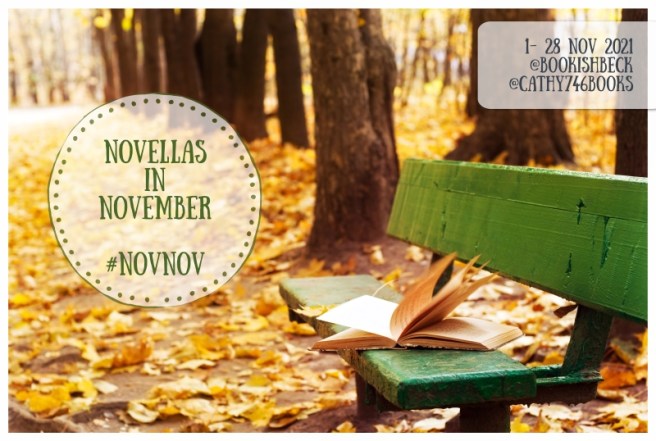
This is the first week of Novellas in November, hosted by Bookish Beck and Cathy at 746 Books, and like Susan and Annabelle, I’m looking back at some of the novellas I’ve previously read.
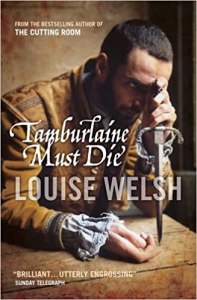
Tamburlaine Must Die by Louise Welsh – set in May 1593, it’s a tense, dramatic story of the last days of Christopher Marlowe, playwright, poet and spy. Accused of heresy and atheism, his death is a mystery, although conjecture and rumours abound. Louise Welsh has used several sources in writing this novella and it has an immediacy, that drew me in to the late Elizabethan world. It conveys the claustrophobic atmosphere of danger surrounding Marlowe; who can he trust, and who is behind the pseudonym of ‘Tamburlaine’, who posted a libellous handbill referencing Marlowe’s plays? He has just three days to find the murderous Tamburlaine, a killer escaped from the pages of his most violent play, Tamburlaine.
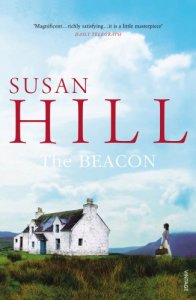
The Beacon by Susan Hill – a compelling story, drawing a picture of a family, four children and their parents living in the Beacon, an old North Country farmhouse. It’s also full of tension, of unspoken feelings and emotions as each child, Colin, May, Frank and Berenice grow up and leave home. Except that May came back after a year at university in London, unable to cope with ‘the terrors’ that began to assail her. As the years pass, May is left at home caring for her widowed mother, after she suffered a stroke. It’s a powerful book about truth and memory, about the ordinary everyday outer lives we live and the inner turmoil and tensions within us. It’s also about what we make of our lives, how we express ourselves and about how other people see us.
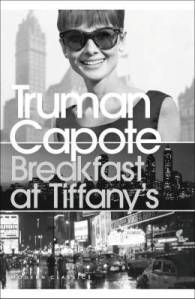
Breakfast at Tiffany’s by Truman Capote is a quick read and very entertaining. The narrator is not named, although Holly Golightly calls him ‘Fred’ after her brother. He’s a writer and at the beginning of the book he is reminiscing about Holly with Joe Bell, who ran a bar around the corner on Lexington Avenue. They hadn’t seen or heard from Holly for over two years. She used to live in the apartment below Fred’s in a brownstone in the East Seventies in New York. Her past is almost as unknown as her present whereabouts. Holly is a free spirit, charming and carefree, but craves attention. She has a cat, plays the guitar and likes to live as though she’s about to leave – all her belongings still in suitcases and crates – and has a great many friends who she entertains with numerous parties. But her life is really a mystery and not all is as it appears on the surface, longing for something wonderful to happen.
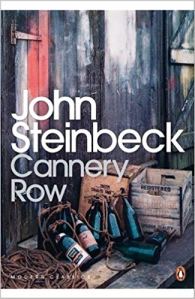
Cannery Row by John Steinbeck – I love this book. Steinbeck’s style is perfect for me, I could see Cannery Row itself, a strip of Monterey’s Ocean View Avenue, where the Monterey sardines were caught and canned or reduced to oil or fishmeal, along with all the characters – no, it was more than that -I was there in the thick of it, transported in my mind, whilst I was reading and even afterwards as I thought about the novel. There is humour and tragedy, meanness and generosity, life and death all within Cannery Row‘s 148 pages, full of fascinating characters including a group of down and outs, lead by Mack, the shop keeper, Lee Chong, who also owns the Palace Flophouse where he lets Mack and the boys live, Dora, a woman with flaming red hair, the madam who runs the Bear Flag Restaurant, Doc who lives and works at the Western Biological Laboratory and Henri the painter who is building and never finishing a boat.
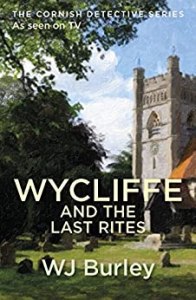
Wycliffe and the Last Rites by W J Burley – set in Cornwall a bizarre murder shakes the village of Moresk. Arriving at church on Easter morning the vicar discovers the body of a woman sprawled across the chancel steps. To add to the horror, the church is filled with the discordant sound of an organ chord, the notes apparently chosen at random and wedged down.Detective Chief Superintendent Wycliffe’s problem in finding the murderer is that all the possible leads pointed to a limited range of possible suspects but none of them matched his specification for the criminal. It seemed he had to believe the impossible. It’s a tightly plotted book, concisely and precisely written and I enjoyed it very much
What an interesting bunch of novellas! I’ve always tended to avoid shorter fictional works until last year, when, like many, I discovered that novellas were perfect for my fractured attention span. They’re now a permanent part of my reading landscape and I see I’ll have to put a couple of your reads on my novella list, particularly Louise Welsh’s Tamburlaine Must Die (Marlowe is such an interesting historical character and his death is so very mysterious, isn’t it?)
The only one of your list that I’ve actually read is Breakfast at Tiffany’s, which I didn’t expect to like and which I loved! Truman Capote isn’t quite my cup of tea (if people still use that expression) but at his best he’s such a great writer he’s hard to resist.
Your enthusiasm about Steinbeck puts me to shame. I’ve never read a single one of his works, which is quite a feat when you realize he’s part of the required canon here in the U.S. I’ve been meaning for some time to give him a try and Cannery Row sounds like a good place to start.
LikeLiked by 1 person
Cannery Row is the first of Steinbeck’s books that I read and thought it was great and after that I went on to read The Grapes of Wrath, a wonderful book! I hope you’ll enjoy his books too.
LikeLike
I read Tamburlaine Mus Die last year and enjoyed it. I thought it was really atmospheric.
LikeLiked by 2 people
I’ve enjoyed all of Louise Welsh’s books that I’ve read – all good.
LikeLike
So glad to see both the Steinbeck and Burley here. And of course, the Capote is great, too, Margaret. You really do have some great choices here. It’s interesting, too, how many novellas there are out there. I think it’s easy to overlook that writing form, so it’s good to have a focus on them.
LikeLiked by 1 person
It’s such a treat to read novellas!
LikeLiked by 1 person
I love Breakfast at Tiffany’s and have always meant to read Cannery Row. A lot of Susan Hill’s books are 200 pages or under — good job for thinking of her! I’ll add her to my ideas list. Thanks for your participation in #NovNov, it’s always great to have you join in.
LikeLiked by 1 person
I’ve found that some of Susan Hill’s novellas are better than others – I don’t find her ghost stories scary and even though they are short there’s a certain amount of extra padding that reduces the tension and atmosphere.
LikeLike
These all sound brilliant and I’m looking forward to reading Breakfast at Tiffany’s but the one I’m desperate to read is Cannery Row. I read The Grapes of Wrath last year and can’t say how much it meant to me – it’s just that I’m such a slow reader and have the classics challenge to finish that has stopped me getting on with reading it, but it’s sitting waiting patiently!
LikeLiked by 1 person
I loved The Grapes of Wrath too – so much better than I expected it to be.
LikeLiked by 1 person
Interesting choices. Steinbeck is always handy if you need a novella. The Pearl is my favorite.
LikeLiked by 2 people
I’ll look out for The Pearl. I enjoyed Sweet Thursday too.
LikeLiked by 1 person
Tamburlaine Must Die is on my list for reading this year for Novellas in November. I hope I get to it.
LikeLiked by 1 person
I hope you do too! If you don’t get to it in November there’s always December … or next year 🙂
LikeLike
Tamburlaine Must Die is amazing!
LikeLiked by 1 person
Yes!!
LikeLike